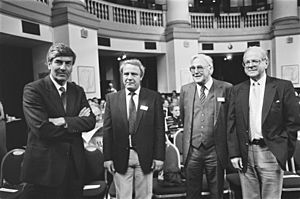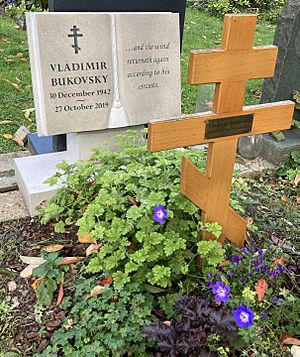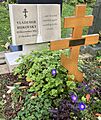Vladimir Bukovsky facts for kids
Quick facts for kids
Vladimir Bukovsky
|
|
|---|---|
| Владимир Константинович Буковский | |
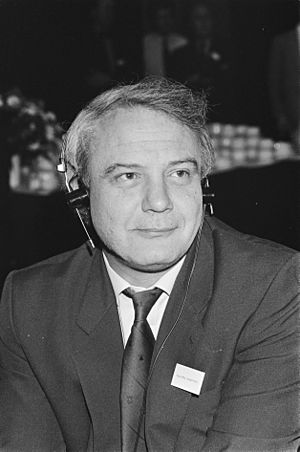
|
|
| Born |
Vladimir Konstantinovich Bukovsky
30 December 1942 Belebey, Russian SFSR, Soviet Union
|
| Died | 27 October 2019 (aged 76) Cambridge, England, United Kingdom
|
| Nationality | Russian |
| Citizenship | Soviet Union (1942–1992); Russian Federation (1992–2014); United Kingdom (1976–2019) |
| Alma mater | University of Cambridge, Stanford University |
| Occupation | Human right activist, writer, neurophysiologist |
| Known for | Human rights activism with participation in the Mayakovsky Square poetry readings, the Campaign Against Psychiatric Abuse and struggle against political abuse of psychiatry in the Soviet Union, Victims of Communism Memorial Foundation, The Freedom Association |
|
Notable work
|
see Vladimir Bukovsky bibliography |
| Movement | Dissident movement in the Soviet Union, Solidarnost (Russia) |
| Awards | The Thomas S. Szasz Award for Outstanding Contributions to the Cause of Civil Liberties, Truman-Reagan Medal of Freedom |
Vladimir Konstantinovich Bukovsky (Russian: Влади́мир Константи́нович Буко́вский; 30 December 1942 – 27 October 2019) was a Russian-born British human rights activist and writer. He was a very important person in the Soviet dissident movement from the late 1950s to the mid-1970s.
He spent a total of twelve years in Soviet prisons, labor camps, and special psychiatric hospitals. This was because he spoke out against the government. After being sent out of the Soviet Union in 1976, Bukovsky continued to speak against the Soviet system. He is famous for helping to stop the unfair use of psychiatry against people who disagreed with the government.
Contents
Early Life and Education
Vladimir Bukovsky was born in Belebey, a town in Russia. His family moved there during World War II. After the war, they returned to Moscow. His father, Konstantin, was a well-known journalist.
Vladimir was kicked out of school in his last year for making an unauthorized magazine. He finished school at evening classes. He then studied biology at Moscow State University. But he was expelled at age 19 for criticizing the Young Communist League, called the Komsomol.
Speaking Out in the Soviet Union
Early Protests
Mayakovsky Square Gatherings
In 1960, Bukovsky started studying biology at Moscow University. There, he and his friends decided to restart informal poetry readings at Mayakovsky Square. These readings had begun in 1958 after a statue of the poet was put up. They connected with others who had taken part in these readings.
Around this time, 19-year-old Bukovsky wrote notes criticizing the Komsomol. The KGB (Soviet secret police) later called this text "Theses on the Collapse of the Komsomol." Bukovsky said the Soviet Union was an "illegal society" with big problems. He believed the Komsomol had lost its power and called for it to become more democratic. Because of this text and his other actions, the authorities noticed him. He was questioned twice and then expelled from the university in 1961.
Bukovsky was arrested in June 1963. He was later found guilty, even though he wasn't there, because he was declared "insane." The official charge was making and having copies of banned anti-Soviet writings. Soviet doctors said he had "schizophrenia" and sent him to a special psychiatric hospital in Leningrad. He stayed there for almost two years. There, he met General Petro Grigorenko, who was also held there.
The Glasnost Protest of 1965
In December 1965, Bukovsky helped organize a protest in Moscow's Pushkin Square. This protest was against the trial of writers Andrei Sinyavsky and Yuli Daniel. He shared a "Civic Appeal" that asked the authorities to follow Soviet laws. These laws required trials to be open to the public and media, a concept called glasnost.
The protest on December 5, 1965, became known as the Glasnost Meeting. It marked the start of the open Soviet civil rights movement. Bukovsky himself could not attend. He was arrested three days earlier and held in various psychiatric hospitals until July 1966.
Protesting the Right to Demonstrate in 1967
On January 22, 1967, Bukovsky and others held another protest in Pushkin Square. They were protesting the recent arrests of other activists. They also stood up for their own right to protest. A new law had been made in 1966 that made public gatherings a crime.
At his own trial in September 1967, Bukovsky spoke out against the government. He said they failed to respect the law. He used Article 125 of the Soviet Constitution to defend the right to organize protests. Bukovsky's words in court were widely shared secretly among people who disagreed with the government. He was sentenced to three years in a labor camp. He was released in January 1970.
Last Arrest and Imprisonment
After sharing important documents, Bukovsky was called a "malicious hooligan" in the official newspaper Pravda. He was arrested on March 29, 1971. He was held in Lefortovo Prison. Then, he spent about three months in the Serbsky Institute, a psychiatric center. This time, they said he was mentally healthy and could stand trial.
During his trial in January 1972, Bukovsky was accused of slandering Soviet psychiatry. He was also accused of talking to foreign journalists and sharing secret writings. He again used his final words in court to reach a wider audience. He was sentenced to two years in prison, five years in a labor camp, and five more years in internal exile.
While in prison, Bukovsky and another prisoner, psychiatrist Semyon Gluzman, wrote a short guide. It was called Manual on Psychiatry for Dissidents. This guide was published widely outside the Soviet Union. It taught people how to act during questioning to avoid being wrongly diagnosed as mentally ill.
Leaving the USSR in 1976
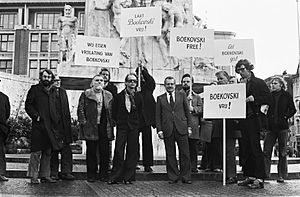
Many people and groups, like Amnesty International, kept telling the world about Bukovsky and other political prisoners in the Soviet Union.
In December 1976, the Soviet government sent Bukovsky out of the USSR. They exchanged him at Zürich airport for Luis Corvalán, a leader of the Communist Party of Chile who was in prison. Bukovsky wrote in his book that he was brought to Switzerland in handcuffs. This widely reported exchange helped people in the West learn more about Soviet dissidents.
In March 1977, US President Jimmy Carter met with Bukovsky at the White House. This meeting was seen as a sign that the new president cared about human rights. Soviet leaders strongly criticized the event.
Bukovsky moved to Great Britain. He settled in Cambridge and continued his studies in biology.
Life in the West
Bukovsky earned a master's degree in Biology from Cambridge University. He also wrote and published his autobiography, To Build a Castle: My Life as a Dissenter (1978). This book was translated into many languages.
Since living in the West, Bukovsky wrote many articles. He criticized the Soviet government and later the government of Vladimir Putin. He also pointed out what he saw as "Western gullibility" (being easily fooled) by Soviet abuses. In the late 1970s and early 1980s, after the Soviet Union invaded Afghanistan, Bukovsky successfully campaigned for the UK and US to boycott the 1980 Olympics in Moscow.
In 1983, Bukovsky helped start and later became president of Resistance International. This group was against Communism. It worked from Paris and included Soviet dissidents and people who had left the country. The group aimed to help democratic movements in Eastern Europe and other places. It organized protests and opposed Western financial help to Communist governments.
In March 1987, Bukovsky and nine other writers who had left the Soviet Union questioned the honesty of Mikhail Gorbachev's reforms. This caused a stir in both the West and the Soviet Union.
Return to Russia
In April 1991, Vladimir Bukovsky visited Moscow for the first time since he was sent away fifteen years earlier.
Before the 1991 Russian presidential election, Boris Yeltsin's team considered Bukovsky as a possible running mate. In December 1991, both of Bukovsky's convictions from the Soviet era were canceled. The next year, President Yeltsin officially gave Bukovsky back his Russian citizenship.
After the Soviet Union
After the Soviet Union broke apart, Vladimir Bukovsky was again not favored by the Russian authorities. He supported Yeltsin during a political crisis in 1993. However, he criticized the new Constitution of Russia. He believed it was made to keep Yeltsin in power. Bukovsky thought that Yeltsin became controlled by security agencies after 1994, and that the KGB would eventually regain power.
Judgment in Moscow
In 1992, after the dissolution of the Soviet Union, President Yeltsin's government asked Bukovsky to be an expert witness. This was for a trial where Russian communists were suing Yeltsin for banning their party. To prepare, Bukovsky was allowed to see many secret documents from the Communist Party archives. Using a small scanner, he secretly made copies of many of these documents, including KGB reports. He then smuggled these copies to the West.
Bukovsky hoped that a special court in Moscow could be like the Nuremberg Trial after World War II. He believed it could help Russia deal with its Communist past.
It took several years to put together the scanned pieces of hundreds of documents Bukovsky copied. In 1999, they were made available online. Many of these documents were used in Bukovsky's book Judgment in Moscow (1995). In the book, he described what he found about recent Soviet history.
The book was translated into several languages. The Polish edition became a best-seller. The English translation was not published until May 2019, shortly before he died.
Political Involvement
In 1992, a group in Moscow suggested Bukovsky run for Mayor of Moscow. Bukovsky refused. He said he would need a large team of smart people who wanted big changes, and there weren't enough such people in the country.
In early 1996, some academics and journalists suggested Vladimir Bukovsky run for President of Russia. He would have been an alternative to the current president, Boris Yeltsin, and the main challenger from the Communist Party. However, a formal nomination process was not started.
Memento Gulag
In 2001, Bukovsky became President of an Italian group called Comitatus pro Libertatibus. This group promoted an annual Memento Gulag, or Memorial Day. It was dedicated to the victims of Communism and held on November 7, the anniversary of the October Revolution. This memorial day has since been held in many cities around the world.
Russian Opposition
In 2002, Boris Nemtsov, a former Deputy Prime Minister of Russia, visited Bukovsky in Cambridge. He wanted to talk about the strategy for the Russian opposition. Bukovsky told Nemtsov that Russian liberals needed to take a strong stand against what he saw as the authoritarian government of President Vladimir Putin.
In January 2004, Bukovsky helped create Committee 2008. This group of Russian democratic opposition aimed to ensure free and fair elections in 2008.
In 2005, Bukovsky was featured in a documentary series called They Chose Freedom. In 2013, he was in another documentary series called Parallels, Events, People. In 2009, Bukovsky joined the council of the new Solidarnost group, which brought together many opposition forces.
Views on the European Union
In a booklet called EUSSR (2004), Bukovsky suggested that the European Union had "Soviet roots." Two years later, in an interview, Bukovsky said he had read secret Soviet files from 1992. He claimed these files confirmed a "conspiracy" to turn the European Union into a socialist organization. He called the European Union a "monster" and said it should be destroyed. Bukovsky was vice-president of The Freedom Association in the United Kingdom, showing his strong views against the European Union.
Presidential Candidacy in 2008
In May 2007, Bukovsky announced he planned to run for president in the May 2008 Russian presidential election. On December 16, 2007, he was officially nominated. The group that nominated him included several well-known activists and authors.
More than 800 Russian citizens nominated Bukovsky for president in Moscow. He gathered enough signatures and submitted his application to the Central Election Commission of Russia. His candidacy also received support from Grigory Yavlinsky, a political leader.
On December 22, 2007, the Central Electoral Commission rejected Bukovsky's application. They said he did not provide information about his writing, held a British residence permit, and had not lived in Russia for the past ten years. Bukovsky appealed this decision in court.
Later Years and Death
In March 2014, Russia took control of Crimea. The West responded with economic penalties against Russia. Bukovsky hoped this would lead to the end of Putin's government.
In October 2014, Russian authorities refused to give Bukovsky a new passport. The Russian Foreign Ministry said it could not confirm his citizenship. This decision surprised human rights groups in Russia.
On March 17, 2015, Bukovsky shared his thoughts on why Alexander Litvinenko was poisoned. He believed the Russian authorities were responsible for Litvinenko's death in London in 2006.
In 2015, Bukovsky faced legal issues in the UK. He had a major heart operation in Germany. After recovering, he sued the UK Crown Prosecution Service for libel. He was later ruled too ill to stand trial.
Vladimir Bukovsky died from a heart attack on October 27, 2019, at age 76. He had been ill for some time. He is buried in Highgate Cemetery in Cambridge.
Documentaries About Vladimir Bukovsky
- Bukovsky (1977) – a film by Alan Clarke.
- They Chose Freedom (2005) (4 parts) – a film by Vladimir Kara-Murza Jr..
- Russia/Chechnya: Voices of Dissent (2005) – featuring Bukovsky and other activists.
- The Soviet Story (2008) – a film by Edvīns Šnore.
- Parallels, Events, People (2014) (36 parts) – a film series by Natella Boltyanskaya.
Images for kids
See Also
 In Spanish: Vladímir Bukovski para niños
In Spanish: Vladímir Bukovski para niños
 | Lonnie Johnson |
 | Granville Woods |
 | Lewis Howard Latimer |
 | James West |


